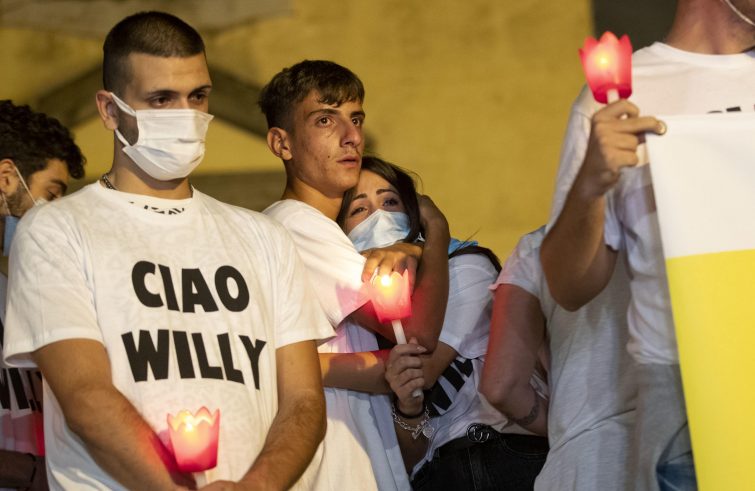
“I don’t consider the young generation a lost generation, however, there is a urgent need to focus on education,” Mario Pollo, anthropologist of education, former sociology and pedagogy professor at Rome’s Lumsa University, told SIR with regard to the murder of young Willy Monteiro Duarte, who died from kicks and punches by four young men slightly older than him while trying to quell a fight.
 Professor, how can you explain such vile and senseless cruelty against a defenceless boy?
Professor, how can you explain such vile and senseless cruelty against a defenceless boy?
We harbour an archaic residue of violence connected to the fact that prehistoric men survived for many years through hunting. Prohibition to kill is not a human instinct. It has become established on a cultural -and subsequently on a legal – level; however, today’s social culture lacks a sound education against violence. We are living in a time devoid of a strong ethical vision shared by all members of civil society. In complex societies, subgroups create principles that deviate from those followed by the larger majority, and education is often incapable of channelling individual drives into behavioural patterns and lifestyles that prevent the violent prevarication of others for purposes of self-assertion.
Cultivating violence for the sake of violence: this was the case for two of the four suspects with a record of drug dealing and assault, infamously known in the village for illicit behaviour. Did everyone know? How could it happen?
It testifies to the absence of a close-knitted community network, to the fragmentation of our present societies where each person relates only to themselves or at most to small enclaves that grow into veritable sub-cultures, while the notion of collective responsibility has been lost. Today, those with a different outlook feel that they cannot/should not offer their personal understanding of the human being, in the name of a supposed plurality of freedoms whereby every idea, opinion, vision of the world has the same value.
A sort of a-critical slime uniforms and puts everything on the same level. As a result, behaviours hitherto deemed offensive and deviant are somehow “accepted”.
As a young man I used to practice aikidō, a Japanese martial art based on self-defense, consisting in turning the opponent’s strength against himself. We were bound by the oath never to exert violence against others and if someone broke the oath that person was sanctioned and expelled from the group. Moreover, this discipline, linked to an ancient cultural tradition, taught us to stay in control of ourselves even during aggression. The martial arts practiced by these young people from Colleferro (MMA, ed’.s note) would seem to be based exclusively on violence and prevarication of others to exercise dominion in the social sphere.
Is our civilization regressing towards barbarity?
We are witnessing a regressive implosion. I hope this is simply a sign of the crisis linked to the passage from modernity to a new, yet undefined, epoch. We don’t know what it will be like, but it will certainly be as distant from modernity as modernity has been from previous epochs. Every crisis can trigger forms of regression, and in some cases even forms of anxious persecution that leads to see others as potential aggressors against whom the use of violence seems to be the only way of self-protection and affirmation. But there is also another problem.
What is it?
Transcendental values are no longer transmitted in contemporary culture.
All that matters are objectives and goals to be achieved: success, well-being; where immediate gain is the only criterion, overlooking the fact that life must have, if not a faith, at least a connection to lofty ideals coupled by the willingness to sacrifice rewarding aspects of one’s life for them. Our societies seem to have lost the fundamental value of the dignity of every human being – this is seen also in the management of the migrant issue – whereby those who are different from us are not worthy of equal dignity.
These aggressors, who mask their weakness with brute force, are not capable of understanding the gravity of their actions, nor of perceiving the suffering that their actions cause in the victim.
 Is there no feeling of empathy? As if they were playing a sort of Mortal Kombat game?
Is there no feeling of empathy? As if they were playing a sort of Mortal Kombat game?
Like in a video game, people for them are empty shells, simulacra. They don’t perceive the mystery and complexity of the lives of their victims, reduced almost to “fictional” characters. Having lost the ability to know themselves, they are devoid of humaneness and can only be recognized through their exterior appearance, tattooed bodies and pumped-up muscles.
This de-humanization transferred into real life somehow ‘legitimates’ violence.
How can we intervene?
By teaching how to relate to others and to oneself, also through group work. For over 30 years I taught cultural animation, educating some one thousand people to teamwork, directed towards creating genuine relationships and transmitting the profound value of human life in all its richness.
Should these processes be initiated at an early age inside the family? Could it be too late in adult life?
“We managed to rehabilitate even adolescents and young people who had taken the wrong paths. My students included a former drug addict – now passed away because he was HIV-positive – who had committed crimes in order to obtain drugs. He entered Don Picchi’s CEIS rehabilitation centre whose workers I trained for many years when Don Mario was there. This young man was able to regenerate himself and his life, he started working in the community and graduated with me from Lumsa University. From a human point of view he is one of the most beautiful people I have ever met. He transformed his terrible past and the damage he had experienced into goodness. I admire him for his path of growth, which is not only cultural, but above all internal and human. This shows that
every person is redeemable and with hard work they can be helped to rise from the abyss.









